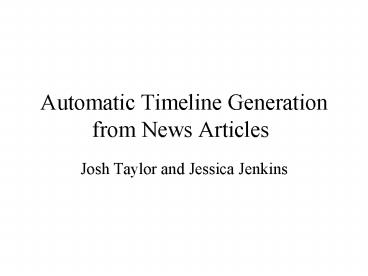Automatic Timeline Generation from News Articles - PowerPoint PPT Presentation
Title:
Automatic Timeline Generation from News Articles
Description:
Automatic Timeline Generation from News Articles Josh Taylor and Jessica Jenkins – PowerPoint PPT presentation
Number of Views:144
Avg rating:3.0/5.0
Title: Automatic Timeline Generation from News Articles
1
Automatic Timeline Generation from News Articles
- Josh Taylor and Jessica Jenkins
2
Motivation
- Finding the major events in an ongoing story is
difficult because news site searches will return
results filled with only the events of the past
two days. - Example a Google News search for Iraq War
yields - Rices recent defense of the war
- Recent polls showing low public support
- But it doesnt return results on
- Build-up to war
- Major military operations
- Lack of international support, U.N. controversy
- Freedom fries
- Timeline presents major events in news story in
an accessible format.
3
Language Model Approach
- Sentences from a set of articles on news story
arranged chronologically. - Construct a language model over sentences based
on frequency counts and sentence ordering. - Use model to score sentences for usefulness and
novelty. - Usefulness Sentence is on-topic for story, i.e.,
doesnt contain tangential information. - Novelty Sentence presents information on a new
event not covered by previous sentences. - Highest scoring sentences are used for timeline.
4
Event-based Model
- Explicitly learn important events in a news story
- by clustering sentences.
- Select representatives from event clusters for
timeline sentences. - Explore various features for representing
sentence vectors for clustering, including named
entities, noun phrases, temporal cues.
5
Evaluation
- Human annotators generate set of important events
in news story. - Each sentence is annotated with a (possibly
empty) subset of the events it covers. - Recall and precision measures based on these
annotations are applied to the sequence of
sentences returned by the system to evaluate the
usefulness and novelty (or non-redundancy) of the
timeline.
6
Information Extraction on Real Estate Rentals
Classifieds
- Eddy Hartanto
- Ryohei Takahashi
7
Problem Definition
- craigslist.org is an online community
- Includes real estate postings
- But search is very basic
8
Problem
- Postings are unstructured
- Would be helpful to have structured information
e.g. deposit, refrigerator, square footage, etc.
9
Project Outline
- Crawl craigslists real estate postings
- Extract structured information from unstructured
text - Offer parametric search on resulting database
10
Implementation Details
- Hidden Markov Model
- States are fields
- Outputs are words
- Use Viterbi algorithm to calculate most likely
sequence of states - Rule-based pattern matching
- Construct rules to identify words in postings
that contain field data
11
Evaluation Measure
- Obtain random subset of postings
- Manually fill in fields of database for each of
these postings - Calculate precision/recall on a variety of
queries on this set of manually tagged data
12
Questions and Suggestions
- We appreciate your inputs
13
Web Crawling Stanford Events
- Group members
- Zoe Pi-Chun Chu
- Michael Tung
14
Scope
- Building a school-wide events calendar.
- Problem information is separated, hard to
maintain/update. - http//events.stanford.edu
- -Requires manual input
- -very few participating departments/student groups
15
Solution
- An automated system
- Builds events database by crawling
- -stanford.edu www pages
- -newgroups
- -mailing lists
- Extract event attributes from text
- (location, time, type, department, free food,
speaker)
16
Technologies
- Java TechnologyBuild on Apache Tomcat
- JSP for dynamically generated webpages
- JavaBeans for data storage
- Java Mail API
- JDBC connects databases
- Lucene search engine
- DatabasesMySQL
17
(No Transcript)
18
Key Algorithms
- Classification
- For deciding whether content is an event
- Segmenting events
- Information Extraction
- -Pattern matching, Part-of-speech tagging
- -Hidden Markov model
19
Evaluation
- Compute precision/recall on CMU seminar
announcements corpus - User test comparison to http//events.stanford.e
du - -Features
- -Usability































